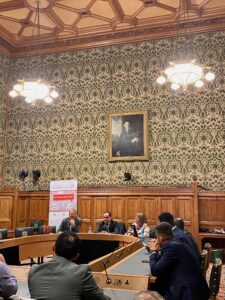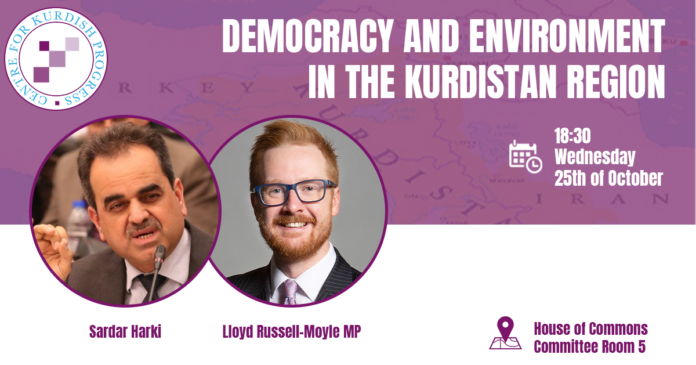Democracy and Environment in the Kurdistan Region
Committee Room 5
18:30, Wednesday 25th of October
Speakers: Sardar Harki, Lloyd Russell-Moyle MP.
On Wednesday, October 25th, a roundtable discussion was held on the democracy and environment in the Kurdistan Region hosted by Lloyd Russell-Moyle MP. The event explored the relationship between democracy and the environment in the Kurdistan Region.

As the Kurdistan Region prepares for elections in February, former Kurdish Parliamentarian Sardar Harki discussed the current state of democracy and law, focusing on electoral processes and civil rights protection. It delves into the expanding federal reach and its implications for Kurdish autonomy, particularly considering resource sharing and territorial disputes. A keen environmentalist, the Harki addressed the region’s growing threat of climate insecurity.
Sardar Harki delved into the intricate relationship between democracy and the Kurdish case, emphasising that this connection transcends the Kurdish situation to encompass all equitable issues globally. He advocated for a tempered outlook regarding the prospects of democracy within Kurdistan, asserting that expectations concerning democratic progress in the region should be kept modest.
In the initial segment of his speech, Sardar Harki spotlighted democracy in Kurdistan, stressing the importance of democracy in recognising and safeguarding the rights of naFons. He noted that, in some instances, democratic mechanisms acknowledge the rights of naFons, particularly minority groups, when they seek self-determination, democracy, or independence. He cited the historical example of Sweden, which successfully aPained its independence through a referendum, ultimately becoming one of the most progressed naFons. He argued that this example underscores the imperative for all naFons in Kurdistan to pursue their rights to achieve democracy.
Sardar Harki also referenced the concept of federalism for Iraq and autonomy for Kurdistan in the quest for democracy. He invoked the ideas of Lincoln by emphasising that a fundamental aspect of democracy is the ability to react, reorganise government, and conduct free and fair elections with numerous opposition parties. He stressed that multiple political parties are crucial for genuine democracy. Opposition parties should possess the right to freedom of expression and criticism and should have the freedom to demonstrate. In a truly fair election, every individual should have the opportunity to express themselves without discrimination. Sardar Harki contended that additional bodies, such as judicial authorities, should hold significant power and responsibility to ensure the exercise of these rights.
As Sardar Harki discussed that the Kurdistan Region, which spans parts of Iraq, Syria, Turkey, and Iran, faces various environmental and climate change challenges. Foremost these is the issue of water scarcity, resulting from prolonged droughts, population growth, and expanded agricultural activities. Land degradation and desertification are also critical concerns driven by deforestation and improper land management. The impact of climate change further exacerbates these problems, marked by rising temperatures, altered precipitation patterns, and increased extreme weather events. The region’s agricultural sector and food security are under duress due to reduced water resources and unpredictable weather patterns.
In summary, the panel discussed the current democracy and legal problems of the Kurdish Region, which is preparing for the elections next February and focused on the election processes and protection of civil rights in the region. Additionally, the effects of the expanding federal area on Kurdish autonomy and issues such as resource sharing were also touched upon, and land disputes were discussed.

